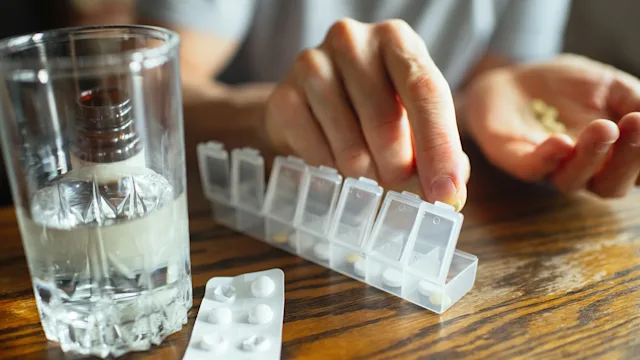Key takeaways:
Studies show that beetroot helps lower systolic blood pressure, the top number in your blood pressure reading. Beet juice doesn't seem to lower diastolic blood pressure, the lower number.
Beets are high in nitrates, a compound that helps open up the blood vessels. This helps reduce the pressure of blood flowing through.
Beeroot's blood-pressure-lowering effects wear off about 10 hours after taking it. And its effect is small, so it’s not a substitute for needed blood pressure medication.
If you're looking to lower your blood pressure naturally, it might be worth turning to beets. The red root vegetable has specific plant compounds that may help improve your blood pressure without medication. But beetroot doesn't help everyone with hypertension.
Here's what you need to know about taking beetroot for blood pressure.
Does beetroot lower blood pressure?
Yes, there’s some solid evidence showing that beetroot can help lower blood pressure. A review study that included about 350 people found that those drinking beet juice saw an improvement in their systolic blood pressure. This is the top number in the reading. It measures the force of your blood pushing against your arteries when your heart beats.
But beetroot juice may not work for everyone. In the study, people didn't see changes in their diastolic blood pressure after drinking beet juice. Diastolic blood pressure is the bottom number. It measures the pressure in your arteries when your heart is relaxed between beats. This study’s results may suggest that those with only high systolic blood pressure (the top number) may see improvements from drinking the red juice.
It’s also important to note that beetroot doesn’t have a big impact on blood pressure. In research studies, it only lowered blood pressure by a few points. So, if you have hypertension or your blood pressure is often high, this won’t be as effective as medication.
How does beetroot work in the body?
Beets are high in nitrates, a nutrient that helps with blood pressure. Here's how that works:
Nitrates convert into nitrites, which then turn into nitric oxide in the body.
Nitric oxide helps widen blood vessels, which reduces the pressure of blood flowing through.
This naturally lowers your systolic blood pressure.
Research shows that beetroot's effects on blood pressure peak after 3 hours of taking it. These effects fully wear off after about 10 hours.
Is there a downside to drinking beet juice?
Beet juice is generally well-tolerated. However, some people who are sensitive to fiber — or don't get enough fiber in their diets — may notice some gastrointestinal (GI) issues. Beet juice has around 3 g of fiber per cup.
But getting more fiber is a good thing. The daily recommended amount is about 30 g per day, if you’re eating a 2,000 calorie diet. But only a small amount (about 5% to 9%) of people in the U.S. get that much fiber. Eating beets or drinking 100% beetroot juice is one way to get more of this heart-healthy nutrient.
Drinks that lower blood pressure: Beet juice is on our list of drinks that can help lower your blood pressure. You may find some of the others are more appetizing though.
Systolic vs. diastolic blood pressure: Learn more about the difference between the top and bottom number in your blood pressure — and why each one is important.
Supplements for blood pressure: If you’re looking for other natural ways or supplements to help with blood pressure, we review the best ones.
It’s important to note that beetroot only lowers blood pressure by a few points. So, it's not as effective as medication for hypertension. That means if you’re taking medicine, it’s best to continue it. And, as always, speak with your healthcare team if you have any questions about your treatment plan.
Can you drink beetroot juice every day?
Yes, you can. The effects of beetroot on blood pressure is most noticeable after 3 hours of ingestion. But the blood-pressure-lowering effects also wear off after about 10 hours. So, if you’re using beetroot to lower blood pressure, that means you’ll need to drink beet juice every day.
If you’re drinking beetroot juice every day, check the nutrition facts label to make sure it doesn’t also contain:
Other fruit juices: The added juice — like apple juice — means your drink isn’t 100% beet juice. But added lemon juice is OK, since it’s added in small amounts.
Added sugars and/or sodium: A diet high in added sugars and sodium can increase your risk for health conditions like diabetes and heart disease.
Save on medications with GoodRx
The bottom line
Research shows that beetroot can help lower systolic blood pressure. But the effects wear off after about 10 hours of taking beetroot. So, you'll likely have to consume it every day to see a difference in your blood pressure. And if you don't like the taste of beetroot, it'll probably be difficult to drink every day. If you're looking for a long-term solution for healthier blood pressure, talk to your healthcare team. Beetroot isn’t a good substitute for blood pressure medication.

Why trust our experts?


References
American Society for Nutrition. (2021). Most Americans are not getting enough fiber in our diets.
My Food Data. (n.d.). Beet juice nutrition facts.
Tomos, J., et al. (2019). The effects of beetroot juice on blood pressure, microvascular function and large-vessel endothelial function: A randomized, double-blind, placebo-controlled pilot study in healthy older adults. Nutrients.
Zamani, H., et al. (2021). The benefits and risks of beetroot juice consumption: A systematic review. Critical Reviews in Food Science and Nutrition.














